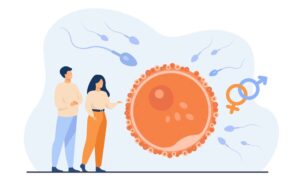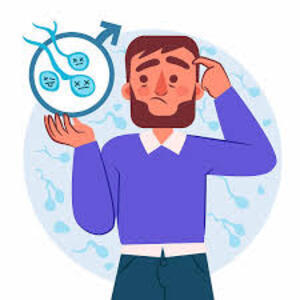
Causes of Low Sperm Count
Several factors can contribute to low sperm count:
- Medical conditions: Varicocele, infections, hormonal imbalances, and genetic disorders can affect sperm production.
- Lifestyle factors: Smoking, excessive alcohol consumption, drug use, obesity, and exposure to toxins can decrease sperm count.
- Environmental factors: Prolonged exposure to heat, radiation, or certain chemicals can impair sperm production.
- Emotional stress: Chronic stress may interfere with hormone levels and sperm production.
- Medications: Some medications, such as certain antibiotics, antifungals, and chemotherapy drugs, can impact sperm production.
- Age: Sperm count tends to decrease with age, especially after 40.
- Diet and nutrition: A poor diet lacking essential nutrients can affect sperm production and quality.
- Tight clothing and prolonged sitting: These can increase scrotal temperature, which may negatively impact sperm production.
Symptoms of Low Sperm Count
Low sperm count might not present noticeable symptoms, but potential indicators could include:
- Difficulty conceiving: Frequent inability to conceive despite regular, unprotected intercourse.
- Changes in sexual function: Reduced libido or difficulty maintaining an erection.
- Pain or swelling: Discomfort or swelling in the testicle area may occasionally occur.
- Hormonal issues: Some individuals may experience decreased facial or body hair growth, or gynecomastia (enlarged breast tissue).
- Ejaculation issues: Premature or delayed ejaculation might be observed.
- Underlying medical conditions: Low sperm count could be linked to certain medical conditions like chromosomal abnormalities or hormonal imbalances.
Treatment Plan
Treatment for low sperm count, also known as oligospermia, varies depending on its underlying cause. Here are some common approaches:
- Lifestyle Changes: Encouraging healthy habits like regular exercise, a balanced diet rich in antioxidants, avoiding excessive alcohol consumption, quitting smoking, and managing stress can all contribute to improving sperm count.
- Medications: Depending on the cause of oligospermia, your doctor may prescribe medications. For example, if a hormonal imbalance is causing the issue, hormone replacement therapy may be recommended. Additionally, certain medications can help improve sperm production.
- Surgery: In cases where there’s a blockage preventing sperm from being ejaculated, surgery may be necessary to correct the obstruction.
- Assisted Reproductive Techniques (ART): In situations where natural conception is difficult, techniques such as intrauterine insemination (IUI) or in vitro fertilization (IVF) may be considered. These methods involve collecting sperm and artificially inseminating the female partner or fertilizing the egg outside the body, respectively.
- Treatment of underlying conditions: Conditions like varicoceles (enlarged veins within the scrotum) or infections can contribute Oligospermia. Treating these underlying conditions can sometimes help improve sperm production.
- Counseling: Coping with fertility issues can be emotionally challenging. Counseling or support groups may help couples manage stress and navigate the emotional aspects of infertility.
Assisted Reproductive Techniques (ART)
Assisted reproductive techniques like Intrauterine Insemination (IUI) and In Vitro Fertilization (IVF) provide hope for couples grappling with infertility due to low sperm count. By directly placing healthy sperm into the female partner’s uterus (IUI) or fertilizing the egg outside the body (IVF). These methods circumvent Oligospermia issues, significantly boosting the chances of conception. With careful medical guidance and technological advancements, couples can explore these options to fulfill their dreams of starting a family.
Choosing the Right Treatment Center
Selecting the right clinic or treatment center is crucial for effective management of low sperm count. Factors to consider include success rates, expertise of the medical team, facilities, and patient reviews.
Opting for Dr. Ankita’s Fertility Center in Mumbai for low sperm treatment offers specialized care and expertise. With advanced facilities and personalized treatment plans, couples receive comprehensive support to address infertility challenges. Dr. Ankita’s commitment to excellence provides hope and assurance on the journey to parenthood.
Success Rates and Expectations
Maintaining realistic expectations during treatment for oligospermia is crucial. Success rates can fluctuate based on various factors, including the underlying cause of infertility and individual health conditions. Discussing prognosis and potential outcomes with your healthcare provider ensures informed decision-making and emotional preparedness. While advancements in fertility treatments offer hope. Understanding that results may vary helps couples navigate the journey with resilience and patience. Fostering a more positive and empowered experience toward achieving their family goals.
Lifestyle Tips
Incorporating a healthy lifestyle alongside medical treatments can significantly enhance sperm production and fertility. Regular exercise promotes hormonal balance and blood flow to the reproductive organs. While sufficient sleep aids in hormone regulation and overall well-being. Effective stress management techniques, such as meditation or yoga, can reduce cortisol levels, which may negatively impact sperm production. Avoiding exposure to environmental toxins, like pesticides or excessive heat, safeguards sperm health. These lifestyle adjustments synergize with medical interventions, optimizing the chances of successful conception.
Conclusion
Low sperm count treatment in Mumbai can seem overwhelming but it is possible to manage with the right knowledge and support. Individuals should understand the causes of the problem and explore available treatment methods. Additionally, they should consider lifestyle changes to improve their chances of conceiving and fulfilling their dream of becoming parents someday.
FAQs
Q1. What are the primary causes of low sperm count?
A. Primary causes of low sperm count include lifestyle factors such as stress, poor diet, and substance abuse, as well as medical conditions like hormonal imbalances and genetic factors.
Q2. Can low sperm count be treated naturally?
A. While lifestyle changes like diet modification and stress reduction can positively impact sperm count, severe cases may require medical interventions such as hormone therapy or assisted reproductive techniques.
Q3. How do assisted reproductive techniques help with low sperm count?
A. Assisted reproductive techniques like Intrauterine Insemination (IUI) and In Vitro Fertilization (IVF) bypass low sperm count issues by directly introducing sperm into the female reproductive tract or fertilizing eggs outside the body, respectively.
Q4. Are there any side effects associated with low sperm count treatments?
A. Common side effects of treatments for low sperm count may include allergic reactions to medications, hormonal imbalances, and surgical complications. It’s essential to discuss potential risks with your healthcare provider.
Q5. What lifestyle changes can I make to improve oligospermia?
A. Adopting a healthy lifestyle, including regular exercise, a balanced diet, stress management, and avoiding environmental toxins, can contribute to improve overall fertility.

